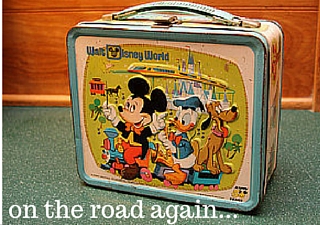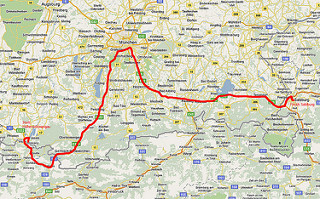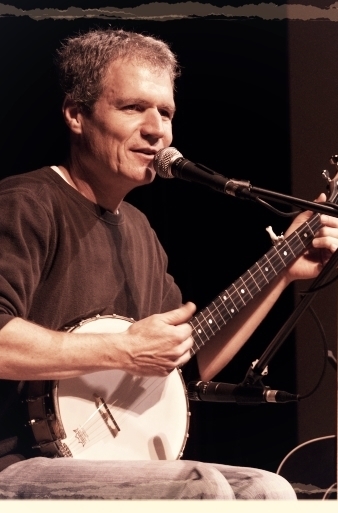Carnegie Hall? Royal Albert Hall? The Kalamazoo Civic Center?
I guess I should clarify.
I didn’t actually mean “how far will your career go?”
 The topic of today’s Educate and Entertain post is this:
The topic of today’s Educate and Entertain post is this:
How far will you go for a booking?
How far are you willing to travel as a performer?
Expanding the geography you’re willing to cover is perhaps the easiest way to expand your income as a performer.
In fact, it might even mean the difference between doing this part-time and full-time.
How It Went For Me
When I started to get more involved in the work of performing in schools, concert venues, libraries, and regional arts centers, it became apparent to me that I actually could build a full-time career around it if I was willing to travel a bit.
With the narrowly-focused niches that I’m in, there simply aren’t enough opportunities here in Buffalo NY to keep my calendar filled year-round with good paying gigs.
However, I love the work, and I wanted to be doing it full-time. How to accomplish that?
Time to hit the road.
 Here are some things to think about in terms of taking your show on the road…
Here are some things to think about in terms of taking your show on the road…
Tours vs. Daytrips
Some Silly People (like me) Prefer Daytrips
You may be in a different situation than I am.
For me, I’ve had a wife and kids to rush back home to since I first started doing this kind of work twenty-some years ago. I simply haven’t been willing to go “on the road” for a long series of days.
So, I’ve structured all of my bookings around my need to be back home at night, and waking up in my own bed, as often as possible.
And because I work in schools quite a bit, this equates to some really stupid, er, excuse me….early mornings.
I might have a 9:15am booking in a town three hours from home, or more.
You can do the math from there.
 (Yes, breakfast is eaten in the car.)
(Yes, breakfast is eaten in the car.)
I might then schedule a second booking for that same afternoon in another town on the way home. (See the article “How To Get Gigs in Schools.”)
(Yes, lunch is eaten in the car.)
Then, home for dinner, clean up the kitchen or help my kids with homework, and generally try my best to continue being a recognizable face in my own house.
The next morning? The cycle might start all over again.
Another common scenario for me would be to book an evening gig in a town two or three (or five) hours away.
In that case, I’d try to schedule a daytime gig en route to the evening performance, then head right back home after the evening concert. (I’d miss dinner and homework of course, but I could be “on the scene” in the morning to help get people off to school.)
For most normal human beings, this kind of travel seems insane.
I totally get that. It’s just what’s worked for me.
The Beauty of the Tour
Of course, if you have the luxury of not needing to be in your own bed each night, stringing a series of geographically-aligned performances together makes a whole lot of sense.
 You can take advantage of things like:
You can take advantage of things like:
- less time behind the wheel
- less impact on the environment
- discount incentives offered to venues for “block booking” you
- having more time to explore the places you visit
- not putting 35,000 miles per year on your vehicle!
Perceived Value of the Traveling Artist
“No prophet is acceptable in his hometown.” – Jesus
Maybe you’ve found this old adage to ring true more often than not; I know I certainly have.
The thing is, it really works to our advantage as traveling performers, because the opposite side of the coin is this:
The second you leave the confines of your home region, your value in the marketplace increases.
 Think about it.
Think about it.
Let’s say there’s an upcoming performance in your area by an artist who works in your genre, but they’re from Chicago. Or Atlanta. Or even a town just two hours away from you.
Even if you haven’t heard of this performer before, isn’t your first thought something like this?
“Hmm, they must be pretty good if they’re touring here from somewhere else…”
And maybe they’re sensational.
But, it’s also possible that their performance is no more compelling than yours; perhaps far less so.
I’ve even had the experience of being hired for a performance a good distance from where I live, for very good money, doing something very similar to what I know another really high-quality, local-to-their-area performer does.
 They paid me considerably more than they would have paid that local performer, and only partially because of the expense of getting me there. (More on that in a minute.)
They paid me considerably more than they would have paid that local performer, and only partially because of the expense of getting me there. (More on that in a minute.)
The amazing thing is this: In talking with that performer, it turned out he had been hired to do a performance in MY home area, also for really good money, sometime that same month.
Jesus was right!
You can’t be a prophet in your own hometown, but you CAN be one in everyone else’s.
(For the record, I’m certainly not implying that performers are interchangable and what we do is a commodity that should be considered strictly on price; just that I think we should never underestimate the perceived value inherent in performing outside of our home region.)
Pricing Considerations
It’s worth talking, at least in general terms, about how we price our performances when we travel.
There are a lot of ways to approach this, of course, and ultimately your situation and your goals will dictate what’s right for you.
For me, I make my living performing for a set fee, so I’m going to give you an idea of how I think about pricing for “road” gigs; this may or may not make sense for you.
(If you can afford to come home with more new fans than money, for instance, these concepts might sound a bit odd to you.)
 The cost of getting there and back
The cost of getting there and back
I think it goes without saying that it simply costs you more to travel away from home for a performance than it does to go around the corner.
Here in the U.S., the federal government’s Privately Owned Vehicle (POV) mileage reimbursement rate ($.56/mile at the time of this writing in 2021) is a good rule of thumb to use in calculating what it will cost you in gas, tolls, and general wear and tear on your vehicle to get where you’re going and back again.
And we really must consider wear and tear on our vehicles – – the more we travel for work, the sooner we’re going to need our next new car.
 Charging for your gas alone isn’t going to cut it, so make sure you’re using a figure that allows you to put some money aside for the day that old Betsy makes her last trip.
Charging for your gas alone isn’t going to cut it, so make sure you’re using a figure that allows you to put some money aside for the day that old Betsy makes her last trip.
OK, so now we have:
Your local fee + your travel expenses
And that’s going to feel like a more reasonable number to you until you strip out the costs of getting there and realize you are now spending a lot more time working for the same amount you make at home.
So…
What is your time worth?
Not only does it cost you more to take your vehicle out of town, but it takes more time. Sometimes alot more time.
 For that reason, I’ve never been a big fan of working on the road for local rates + expenses.
For that reason, I’ve never been a big fan of working on the road for local rates + expenses.
For me, I always build something into my fee for the time I’m going to be sitting in the car.
Why?
Because if those four or six or eight hours of travel are not being compensated in any way, I’ve just cut my hourly earnings in half, or much worse than that!
My time would actually be much better spent at home doing more marketing and looking for additional booking opportunities.
Eight hours in my office drumming up new work is actually more valuable to me than eight hours of unpaid time in the car to get to a gig where I’m going to earn the same thing I make locally.
(You may be interested in the article How Much Should I Charge? 3 Pricing Strategies for Performers.)
Do You Take Your Show on the Road?
Now it’s your turn. Are you traveling far and wide to keep your calendar filled?
I’d love to hear about what works for you. Leave me a note in the Comments section below.
[optin-monster-shortcode id="rcuum7ur3xhssg8o"]
About The Blog
 Since leaving a white-collar marketing job in 1992, Dave Ruch has been educating and entertaining full-time in schools, historical societies and museums, folk music and concert venues, libraries, and online via distance learning programs.
Since leaving a white-collar marketing job in 1992, Dave Ruch has been educating and entertaining full-time in schools, historical societies and museums, folk music and concert venues, libraries, and online via distance learning programs.
Along the way, he’s learned a great deal about supporting a family of four as a musician.
The Educate and Entertain blog provides articles, tips, encouragements, and how-to’s for regional performers (in any region) interested in making a great full-time living in the arts.


I’m so glad to have found your blogs!! I’m a singer primarily and trying to learn guitar. This information is so helpful. Thank you for sharing!
Don’t you find that prices vary of course from region to region ? It is hard to know what to charge these small town schools as opposed to big city schools and venues. I always find myself asking what is your budget? When I should be just standing firm and asking for what we need. But then, the smaller out of town places just can’t pay that. Quite a quandary!
Nancee
I charge the same fees everywhere (separate from travel expenses) – large schools, small schools, urban, rural, etc.
Another good, tip-filled newsletter – thank you! I actually enjoy getting out of town for a show. I enjoy spending time in the car with the radio blaring music that gets me in the mood to get on stage. That said, 100 miles (2-3 hrs.) each way has to have some kind of compensation. I start with a flat rate for my show. There are discounts for nonprofits and venues who schedule multiple gigs in a season. I build in a flat $25 for local/regional gigs that are more than 20-25 miles from home. The first 20-45 minutes is free; after than, I’ve been adding $10 per hour behind the wheel. It’s not a lot but, it means I can keep the money I earn at the gig and another $50-$60 to take the sting out of travel time and C-store lunches.. I’ll be interested to see how others deal with the cost of travel. For example: what do you do for multiple gigs and overnight stays? I have a couple of these ‘mini tours’ every year and I’d like to hear how other handle it. Thanks again for the info and the forum. – JK
I enjoy it as well, Jim. Peace and quiet in the car and a great time to catch up on podcasts and new music. I typically build in an extra $50 per hour of travel time, to compensate not only for car expenses but (at least a little bit) for my time.
Dave, you are right about the time and toll of traveling to gigs. Driving drives you crazy, especially that pre-dawn, breakfast behind the wheel jaunts. I find however asking venues, especially schools for additional travel charges, counterproductive. Also, driving more than four hours to and from a gig, too painful. No matter how much yoga I do, the old back and thighs complain.
When pitching performances to a venue over two hours from my Hudson Highlands home, I just talk about all their benefits. Then, when I feel they are excited and sold, I give them an “all included” fee. Adding to my fee the fifty-eight cents per mile, the hotel, my diner stops, and hits of vitamin B12’s is nickel and diming.
Typically, all of the costs above on an overnight adds around $150. to my fee. Fortunately, my Prius gets about fifty mpg. I tell prospects their cost drops usually around 25% if I get another gig in their vicinity. I just ask them for contact names numbers and emails, and permission to use them as a reference. Then, I do most of the courting to land that other local gig. Those additional booking, however, happens less than half the time for me. I’d like to change that story.
From one Prius driver to another, cheers Jonathan! And yes, and “all inclusive” fee is what I quote as well. They don’t need to be concerned with all of my various expenses – just what it’s going to cost them to have me there. They can decide from there whether it’s worthwhile or not.
I like the idea of turning long-distance gigs into mini tours. I haven’t tried it yet but, maybe I should. Offering a discount attached to other, nearby gigs with the venue’s help is a super idea. Can’t wait to try it. Thanks~ – JIm
Another way think about it, and possibly discuss with potential clients, is, if $300 cash was hidden in a flower pot, at the client’s venue, would you spend all the time it would take to drive there & back, to get the $300?
If not then why would you prepare all their special music, arrange dog-sitting, get dressed up for the gig, put all your gear in your van, drive there, spend an hour to get all your gear set up, perform music for 2 hours, take down, drive back and put all your gear away, for $300?
Sometimes we sell our work too cheaply. I would never just bolt out of my house in my blue jeans & tee to go get that $300, if it took “only” 7-8 hours out of my day. If it takes that much time PLUS 20 phone calls, 50 emails, customized sheets, organizing a group of musicians, making sure my gear is operable, having a van to haul gear, etc etc then that $300 is really paltry.
The strange thing is, if you try to point this out to a client they might be offended at you, but they will somehow retain the facts, and will probably hire someone else at the price you requested.
Clients need to understand the “total” time commitment that is required. Even if it is a “really short” wedding or a 30 minute memorial service, the “total” time is probably 10x longer than just the time on the day of the event, especially when you add in all the overhead expenses (including all your time spent on prospective clients who don’t actually hire you).
All the newbies are so cheap because they have not come to the realization of how much total time each gig requires.
Hi Vicky – sorry for the delay in responding here. I use the same “flower pot” scenario (dollar bills blowing by one at a time – would I sit outside for an hour to collect 12 of them, or 2o, or even 40?) And I don’t disagree with what you say at all about clients not understanding all the work that goes into us providing music for them. BUT, I feel that the client needs to BELIEVE that we actually enjoy what we do, and that THAT is part of our reward. I also believe it NEEDS to be part of our reward, for ourselves and our sanity. Otherwise we might as well go dig ditches for the same money.
I also agree with you that pointing out all of the extra effort it takes to provide a quality experience for our buyer is not a winning strategy, and is likely to turn them away. I never do it. I simply figure out exactly what I need to make, and I quote that price. If others are cheaper and getting booked consistently to my detriment, then I’m in the wrong market.
Dave, I totally hear you, we do need to “enjoy” our work, at the same time, our work needs to pay the bills & have enough to save for our senior years…..SO…..even though there may be “others” who are cheaper and “getting booked consistently” eventually these cheaper folks will have a meeting with a financial planner and realize, Oh, DUH, I need to be saving more money, and they will re-price themselves.
I know, it is a balance point thing, but if everyone goes lower, lower, lower on their prices, pretty soon we have a Mickey D’s style Dollar Menu and who in the world ENJOYS working for peanuts? Not me.
Yep, that’s a race to the bottom.
Good incite Dave. It is very difficult for us to get good bookings in our home state but we are well received and in much more demand at nationally known venues out of state. Another problem playing locally is that you soon saturate your own market. If we limit our local performances to one or two a year, we can draw a couple or three hundred people. If we were to play locally every weekend I think it would be down to maybe a dozen or whoever walks in.
We do event music mostly weddings, and have found a flat rate for the event works best. I You mention your “travel fees” the client tends to scrutinize it….if you mention “travel time” they complain it is too much to pay for “doing nothing.”
So we make it a flat rate, taking into account distance, possible ice/snow storms, and Friday rush hour travel— in our area the Fri rush begins around noon, so it requires considerable additional time to make sure we arrive on time, compared to a Sat or Sun event.
But I don’t tell the client all of these calculations– it will only invite unwanted scrutiny.
Agreed Cheryl; one price is best. Thanks for sharing.
Thanks for another great article, Dave. Here in Iowa I have found in talking to libraries and teachers that it is easier for them to get the money they need to pay me if the cost is one fee, not fee + travel. So, I figure that up and call it one fee. I agree that it is nice to go out and come home the same day, and I can make it to a gig or two in Western Iowa and still get back to Eastern Iowa in good time to see the family. I did, though, string together a set of libraries in Western Iowa this summer and went with my wife for a work/play several days. I’m going back later this moth for a couple of days. Thanks again for informative, useful advice.
Hey Darrin – thanks for checking in here. Excellent point re: folding all expenses into your rate – I do the same thing, quoting an inclusive price after figuring out my expenses. It helps sometimes with those who have grant funding too, as some grants stipulate they will only pay for artist fees and not for travel expenses.
Hey Dave-You mention you charge for the time you anticipate getting to and from a gig. I believe you mentioned $25 or 50 per hour in another article. Do you also charge for mileage or do you only charge for travel time?
Hey Bill – I just use a figure of $50/hour of travel time to simplify things in my own mind, and that number covers mileage and “wear and tear” as well.
Dave, I was reading through this article this morning and had forgotten that I had commented on it. I wanted to let you know, that I have been applying your advice on email marketing, and it has made a huge difference. my usual fall programming email might generate a few gigs. I actually learned how to use my web site’s email marketing tool and created a good looking email that tells clients how I can meet their needs, with a subject line that does the same. Oh my word. My October is packed, and all from making a few minor changes. Thanks so much!
That’s music to my ears Darrin – thanks for letting me know! And kudos to you for experimenting until you find something that works.
Exactly my thoughts. I charge a set fee for the performance and add $1/mile beyond 50 miles.
I guess great minds (and ours, too) think alike! Thanks Roland.
This is one helluva terrific article and very very helpful. Thanks very much. I will post it on facebook for you. I am going to print this article and then study it until I can do it. I used to play classical piano gigs at senior citizen places…then retired for awhile, but now I am broke and am going back to music, which I love. I was going to switch to guitar and voice and sing folk songs of the past, as I once did that too.
I do want you to know that I really appreciate your articles. You are quite a dude…helping others in this wise. Thank you very much. You are a special person.
Best to luck Jerrye, and thanks for the great comments.
Hey Dave,
I ‘m enjoying your posts! I am a fan of travelling to gigs that aren’t more than two hours away. I enjoy the “rock star” excitement from the audience, but I am wiped out after I get home after driving 2-4 hours roundtrip, alone…I loved your ideas around booking gigs on the drive home after early morning gigs, and vice versa! Thanks for the tips!
Good stuff.
So glad to hear it Annette. What kinds of gigs are you doing?
Annette, Dave: I agree with Annette. I am only looking for gigs w/in 60 miles of home. Further would be a rare exception if it was arranged due to a friend/ family member. I am so tired after speaking to a group about my WWII tour of Europe and WWII books that my husband accompanies me to do the driving. I typically get hired by libraries and don’t like to be out at night on dark roads alone, let alone possible weather/car problems. So I charge a certain amount for travel which includes time for both of us. But I like your idea of stating a certain price and not breaking it down for the vendor. I read all of your posts. Thanks for the excellent dialogues here too.
Great stuff, Dave!
As a member of a five/six-piece outfit, those considerations are multiplied. Add to that several in the group are still working full-time jobs. Granted, with enough notice we can arrange the time-off from work. But car-pooling, equipment moving, and distance all figure in, sometimes with some disappointing results. Getting one’s name and sound out there, though, tends to be worthwhile and very often results in future gigs.
Of course, we’re on the honky-tonk/dance-hall circuit that tends to be more bar and lounge-driven…
Looking forward to next week’s topic!
Hi Phil – thanks for sharing your experiences, and for the good words.